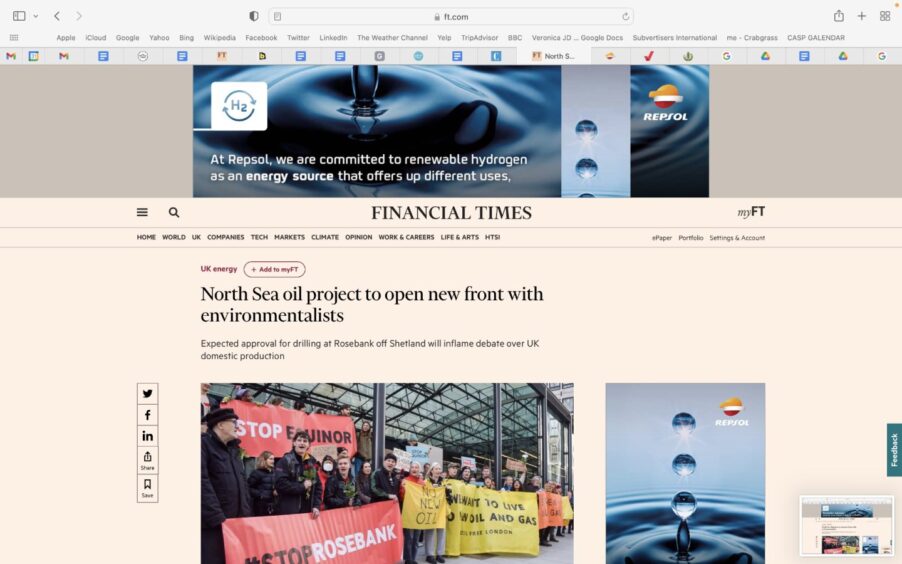An ad for global energy firm Repsol’s involvement in renewable hydrogen has been banned for omitting to make any mention that large-scale oil and gas forms the “vast majority” of its business.
The online ad on the Financial Times website in July featured an image of a water droplet with the caption: “Renewable hydrogen, another alternative to reduce emissions. At Repsol, we are committed to renewable hydrogen as an energy source that offers up different uses such as zero net emissions synthetic fuel production.”
The ad also featured graphics including the text “H2”, a solar panel with a sun, a car with a stylised letter “e” that had a plug at the end, a wind turbine, a sapling, and a petrol pump with a leaf on it.
Adfree Cities complained that the ad was misleading because it omitted significant information about the overall environmental impact of Repsol’s (MCE:REP) business activities.
Repsol said its investments in low-carbon energy make up a third of its total spending, and it aims to achieve net zero emissions across its business by 2050.
The firm describes itself as the largest operator in the Spanish electric vehicle (EV) charging network, while also developing and selling liquid fuels, gasoline and diesel, renewable biofuels, and natural gas for vehicles, producing an average of 600,000 barrels of oil equivalent per day, of which nearly 70% is gas.
It said it is a Spanish company with no relevant presence for consumers in the UK market, and the ad had been targeted at potential investors in the energy sector rather than the general public.
It added that it has no obligation to describe the totality of its business activities in an ad, and that the ad could not have misled consumers or investors into making a transactional decision that they would not otherwise have taken.
The ASA said Repsol’s carbon emissions stood at 171 million tonnes of carbon dioxide equivalent (CO2e) in 2021 – 50% of the UK’s emissions in 2021 – and it produced approximately 600,000 barrels of oil per day.
The watchdog noted that the company also has a substantial oil and gas exploration strategy, owning an interest in 40,660 acres of oil and gas development and exploration across Europe, Latin America, North America, Africa, and Asia and Oceania.
The ASA said: “We therefore understood that large-scale global oil and gas investment and exploration formed the vast majority of Repsol’s business interests.
“We considered the ad gave the overall impression that a significant proportion of Repsol’s business comprised lower carbon energy, such as renewable hydrogen, and therefore further information about the proportion of Repsol’s overall business model that comprised lower carbon energy was material information that should have been included.
“Because the ad did not include that information, we concluded it omitted material information and was likely to mislead.”
The ASA ruled that the ad must not appear again, adding: “We told Repsol to ensure that their future ads featuring environmental claims did not mislead by omitting significant information about the proportion of their business activities that were comprised of renewable energy, or the role renewable energy and renewable hydrogen played in their business activities.”
Recommended for you



 © ASA/PA Wire
© ASA/PA Wire 






